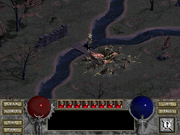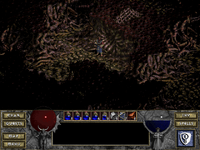mNo edit summary |
No edit summary |
||
| (16 intermediate revisions by 9 users not shown) | |||
| Line 1: | Line 1: | ||
| + | {{Hellfire}} |
||
| ⚫ | |||
| + | |||
| + | [[File:Screen01.png|thumb|Entrance to the Festering nest - after being blown up with a rune bomb.]] |
||
| + | [[File:Hive.png|thumb|200px|A Monk in the Hive]] |
||
| ⚫ | The '''Festering Nest''' (or sometimes known as '''The Nest''' or '''The Hive''') of the ''[[Diablo: Hellfire]]'' expansion is a cavernous underground area that has been completely infested and befouled by insect-like creatures, that lies beneath the strange-looking growth in the field of [[Lester|Lester the Farmer]]. |
||
The walls and floors themselves are alive, oozing with slime and grossness, and the ground is saturated with toxic, bubbling acid. The barrels that appeared throughout the original game are replaced in the Festering Nest levels with organic body-snatcher-ish pods. |
The walls and floors themselves are alive, oozing with slime and grossness, and the ground is saturated with toxic, bubbling acid. The barrels that appeared throughout the original game are replaced in the Festering Nest levels with organic body-snatcher-ish pods. |
||
| − | Many of the creatures of these levels blend into the walls and floors, becoming hard to see them until they move. All the creatures are alien in appearance, with mostly insect-like traits and attack modes. An insectoid beast called |
+ | Many of the creatures of these levels blend into the walls and floors, becoming hard to see them until they move. All the creatures are alien in appearance, with mostly insect-like traits and attack modes. An insectoid beast called [[The Defiler]] is responsible for the many atrocities in the Nest, and only by slaying it can this place of filth be cleansed. |
| + | |||
| + | == Tauntings == |
||
| + | :"''We have long lain dormant, and the time to awaken has come. After our long sleep, we are filled with great hunger. Soon, now, we shall feed...''" |
||
| + | :"''These lands shall be defiled, and our brood shall overrun the fields that men call home. Our tendrils shall envelop this [[Sanctuary|world]], and we will feast on the flesh of its denizens. Man shall become our chattel and sustenance.''" |
||
[[Category:Diablo I]] |
[[Category:Diablo I]] |
||
| + | [[Category:Khanduras locations]] |
||
Revision as of 00:13, 2 July 2018

Entrance to the Festering nest - after being blown up with a rune bomb.

A Monk in the Hive
The Festering Nest (or sometimes known as The Nest or The Hive) of the Diablo: Hellfire expansion is a cavernous underground area that has been completely infested and befouled by insect-like creatures, that lies beneath the strange-looking growth in the field of Lester the Farmer.
The walls and floors themselves are alive, oozing with slime and grossness, and the ground is saturated with toxic, bubbling acid. The barrels that appeared throughout the original game are replaced in the Festering Nest levels with organic body-snatcher-ish pods.
Many of the creatures of these levels blend into the walls and floors, becoming hard to see them until they move. All the creatures are alien in appearance, with mostly insect-like traits and attack modes. An insectoid beast called The Defiler is responsible for the many atrocities in the Nest, and only by slaying it can this place of filth be cleansed.
Tauntings
- "We have long lain dormant, and the time to awaken has come. After our long sleep, we are filled with great hunger. Soon, now, we shall feed..."
- "These lands shall be defiled, and our brood shall overrun the fields that men call home. Our tendrils shall envelop this world, and we will feast on the flesh of its denizens. Man shall become our chattel and sustenance."
